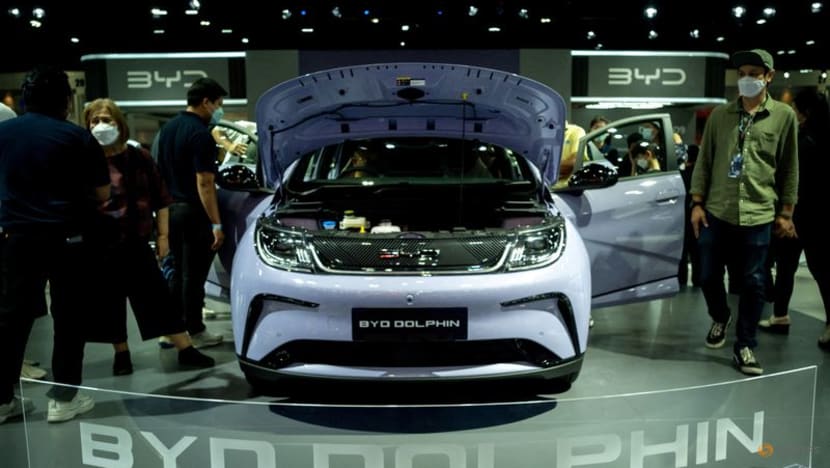Commentary: Chinese EVs are putting a high-tech spin on 'Made in China' label in Southeast Asia
The rapid expansion of Chinese electric vehicles and related investments in Southeast Asia is no fluke, says Intellisia Institute's Xirui Li.


This audio is generated by an AI tool.
GUANGDONG: If electric vehicles (EVs) are the future, will it be China leading the way? Chinese company BYD dethroned Elon Musk’s Tesla as the world’s best-selling EV maker for the first time in the last quarter of 2023.
China’s domestic market has already emerged as the largest EV sales market in the world and Chinese EVs are getting more popular among Southeast Asian consumers, accounting for about 75 per cent of the EV market.
BYD is the best-selling EV brand in Singapore, and last year became the first Chinese brand to break into the country’s top 10 best-selling car brands. Chinese cars comprised 80 per cent of Thailand’s EV sales in 2023, with BYD again the best seller, accounting for 40 per cent of EV sales.
Sales of Wuling Air EV, a model owned by China’s SAIC Motor, surged by 65.2 per cent in 2023, becoming the second most-purchased brand in Indonesia. A survey shows that 66 per cent of Indonesian vehicle consumers have positive views of Chinese EVs because of their affordability, innovative features mobility, and comfort.
The popularity of Chinese EVs in Southeast Asia seems to indicate that China is getting increasingly recognised for technology development and high-tech products, as opposed to the old impression that China is merely the "world factory” where “Made in China” is seen as shorthand for cheap and low-value-added goods.
CHINA’S INVESTMENT IN SOUTHEAST ASIA EV AMBITIONS
Certainly, the rapid expansion of Chinese EVs and EV-related investment in Southeast Asian countries is no fluke.
China’s attention to the technology of new energy vehicles can be dated back to as early as the 1990s, but it was not until 2009 that the development of the EV industry was established as a national strategy.
Since then, Chinese EV and EV-related companies have significantly increased their presence in Southeast Asia. Besides localising their production in the region, they are also actively participating in the advancement of the ASEAN countries’ EV ambition and technology advancement.
In Singapore, Nio is building an artificial intelligence and autonomous driving research and development centre.
Geely has committed to helping Malaysia energise its EV market with a US$10 billion investment and develop a hub in Perak called Automotive Hi-Tech Valley with its Malaysian partner. The Valley's vision is far beyond EVs, but it is also eyeing next-generation vehicles.
In Thailand, Great Wall Motor (GWM) has invested in two full-production lines. SAIC Motor has promised to develop a new energy industrial park, which will enhance Thailand’s position in the EV supply chain. BYD has announced that it will start making EVs in Thailand, Vietnam and Indonesia as early as 2024, making contributions to those countries’ goals to become EV manufacturing hubs.
Chinese EV battery manufacturer Ningbo Contemporary Brunp Lygend has recently promised to invest US$420 million to support the development of Indonesia’s EV ecosystem and enhance the country’s dominance in the supply of nickel, one of the most important raw materials for EV batteries.
A GROWTH OF SOFT POWER?
Some might see the increasing attraction of China as a growth of its soft power in Southeast Asia.
But that remains to be seen. Several factors may determine how far China can capitalise on its EV attraction in the region and thus shape the ASEAN countries’ behaviours.
First, it may depend on whether Chinese EV and EV-related manufacturers can still lead the market. The boom of China’s EV industry is largely driven by the Chinese government’s substantial supportive policies.
With the government gradually reducing EV subsidies, it will depend on how Chinese companies adapt to the market while maintaining their advantages in prices and R&D. Legacy carmakers, especially those from Japan which used to dominate the ASEAN automobile market, are also racing to catch up with new and affordable EVs.
In addition, how China and Chinese firms can make critical technological breakthroughs, especially in semiconductors for EVs given the chips and chipmaking equipment export restrictions imposed by the United States, may also play a role.
Second, lessons tell us that Chinese investments can easily get caught in crossfire in the domestic politics of the countries where they set up, to be made scapegoats and harshly criticised for political mileage. In the United States, upcoming EV battery factories by China’s Gotion High-Tech in the states of Michigan and Illinois are seen as an economic blessing by their Democratic governors but described as a “Trojan horse” by Republicans.
To what extent the Chinese government is willing or capable of using EVs and EV-related investment as an economic statecraft is also a question, and whether it will risk pushing Southeast Asian countries to take sides amid the intensifying US-China rivalry.
STAYING AHEAD OF THE PACK
At a time when climate change is on many national and global agendas, China could well leverage its EV dominance and other clean energy investments to win over partners. Many countries in the Global South, especially Southeast Asian states, have adopted EV promotion policies and vowed to develop a greener society.
Indeed, Chinese EVs have been getting more and more attention abroad. Analysts estimate that Chinese outbound foreign direct investment in EV-related industries is likely to have set a new record high in 2023 and expect Chinese EVs to double their global market share by 2030.
However, to what extent China’s EV boom will mean the growth of its soft power in Southeast Asia, and even the world, depends on how China copes with three challenges: How it transforms and optimises domestic EV policies; how it can make EV outbound investment the consensus across governing and opposition parties in the hosting countries; and last but not least, how China deals with the rapid internationalisation of its EV companies in the face of increasing geoeconomic and geopolitical competition with the West.
Xirui Li has a PhD from the S Rajaratnam School of International Studies, Nanyang Technological University, Singapore and is a research fellow in think tank Intellisia Institute.


















